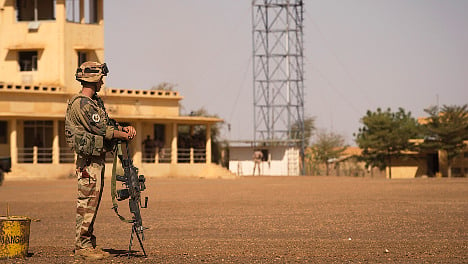LATEST:
- The released men landed in Paris at around12:45pm local time where they were due to be greeted by President François Hollande
- The French president describes their release as a "moment of great joy"
- Sources claimed on Wednesday that a ransom of over €20 million was paid to free the four hostages
- French government angrily denies claims of ransom beingpaid
- Families of the kidnapped men have expressed their joy at the news of their release
Did France pay for the release four French hostages who were held captive in Niger by Al-Qaeda militants for three years?
That is the question being asked in France today as the four men returned home to their families on Wednesday after three years in captivity. There was joyous scenes as the men were mobbed by loved ones as they stepped off the plane.
“This is a moment of great joy,” French president François Hollande said from the airport runway after greeting the men.
“I want to salute their courage. Three years of waiting, and suffering. They’re not just men who struggled through these moments, but great French citizens who honoured France in their captivity,” he added.
Earlier French daily Le Monde, citing a source close to the operation to free the men, published claims on Wednesday that a ransom "of over €20 million" was indeed paid.
The source, who talked about an eight-day operation to free the men, said the money was paid out of three secret bank accounts.
Another source, close to the Nigerien negotiating team, quoted by AFP, said between €20 and €25 million was paid.
The money went to the hostage-takers and to intermediaries on the ground who played a key role in securing the release, the source added.
These claims, however, are contrary to statements made by the French government in the aftermath of the hostages' release.
"France does not pay ransoms. This is repeated every time…. There is no need to return to the subject," a source in the presidency told AFP on Wednesday.
The exact circumstances of the release were not immediately clear, but French Defence Minister Jean-Yves Le Drian said there had been "no assault" to free the hostages and that no ransom had been paid.
The Four Frenchmen kidnapped by Al-Qaeda militants in Niger took off from Niamey bound for home on Wednesday after more than three years in captivity.
The white French government plane left around 0600 GMT carrying the four former hostages heading for Paris. The four men are expected to land in Paris after midday local time, where they will be greeted by French President François Hollande.
Hollande was to greet the quartet on their arrival at an airport outside Paris after what he called "three years of suffering for the families who lived through a nightmare".
"I want to express my gratitude to Niger's president, who was able to obtain the release of our countrymen," Hollande added.
Foreign Minister Laurent Fabius told AFP the hostages had been freed in neighbouring Mali, and were in "very good shape".
"They have been hostages for three years and the nightmare is finally over," he said.
The four men appeared thin but otherwise in good health, an AFP reporter at the scene said.
In a brief remark to AFP at the airport, one of them, Thierry Dol, 32, said: "It was very difficult but it was the test of a lifetime."
Francoise Larribe, who was kidnapped along with her husband Daniel before she was freed in February 2011, said on learning of her husband's release:



 Please whitelist us to continue reading.
Please whitelist us to continue reading.
Member comments